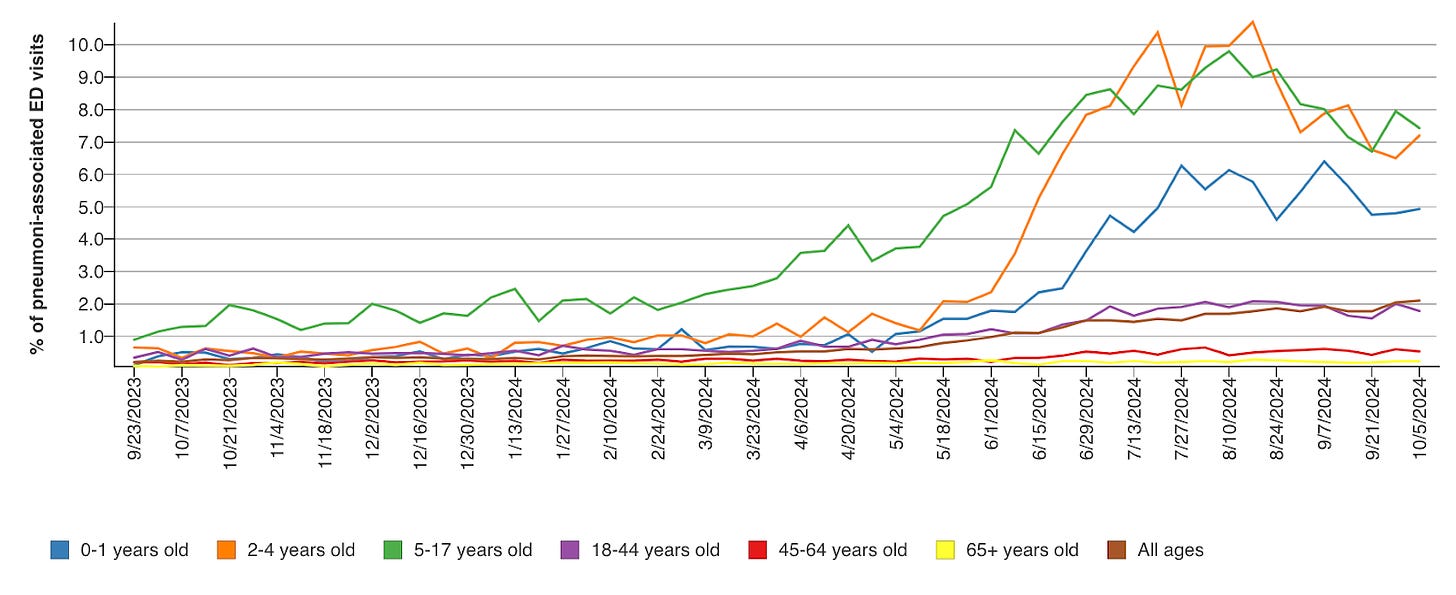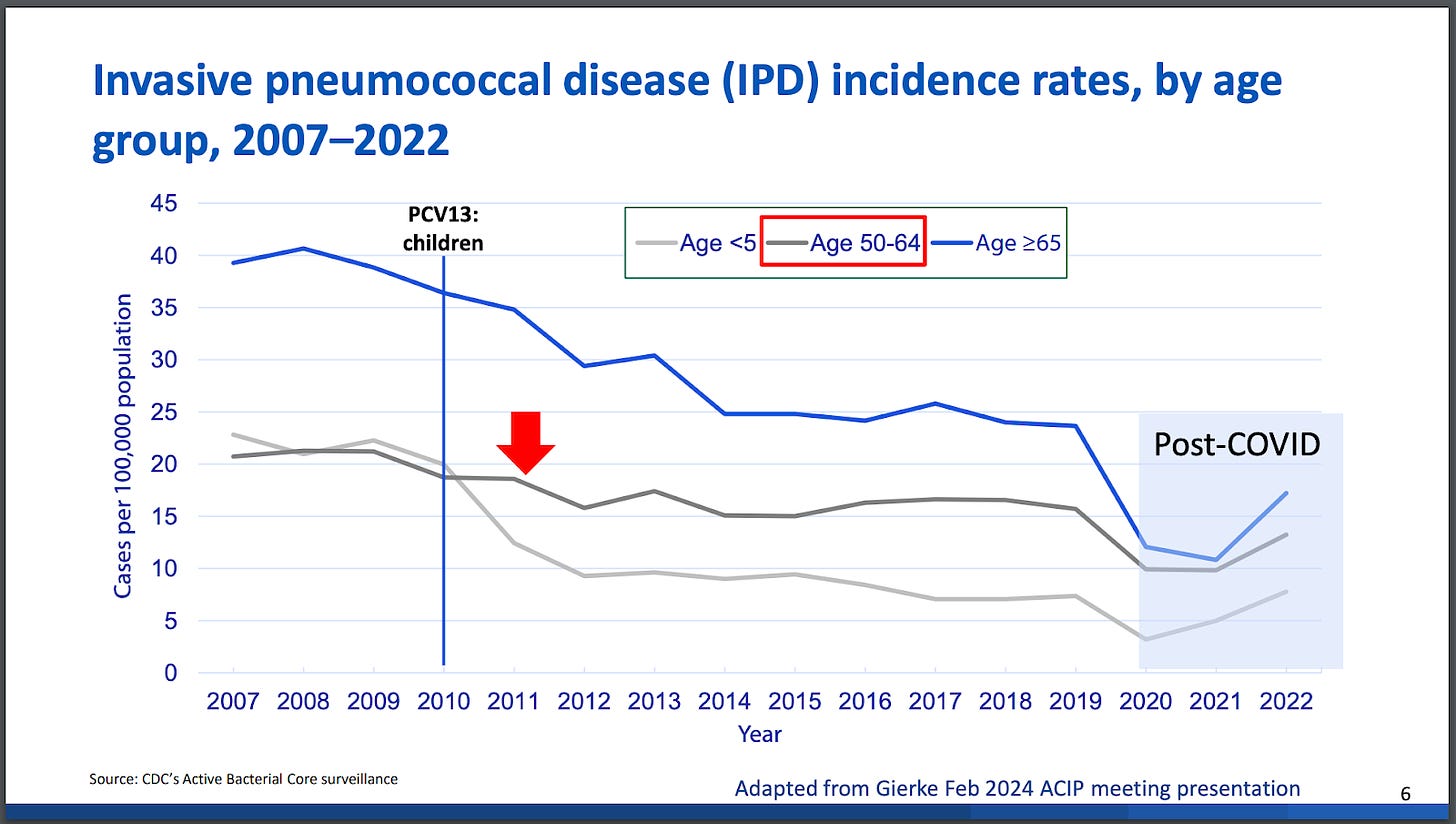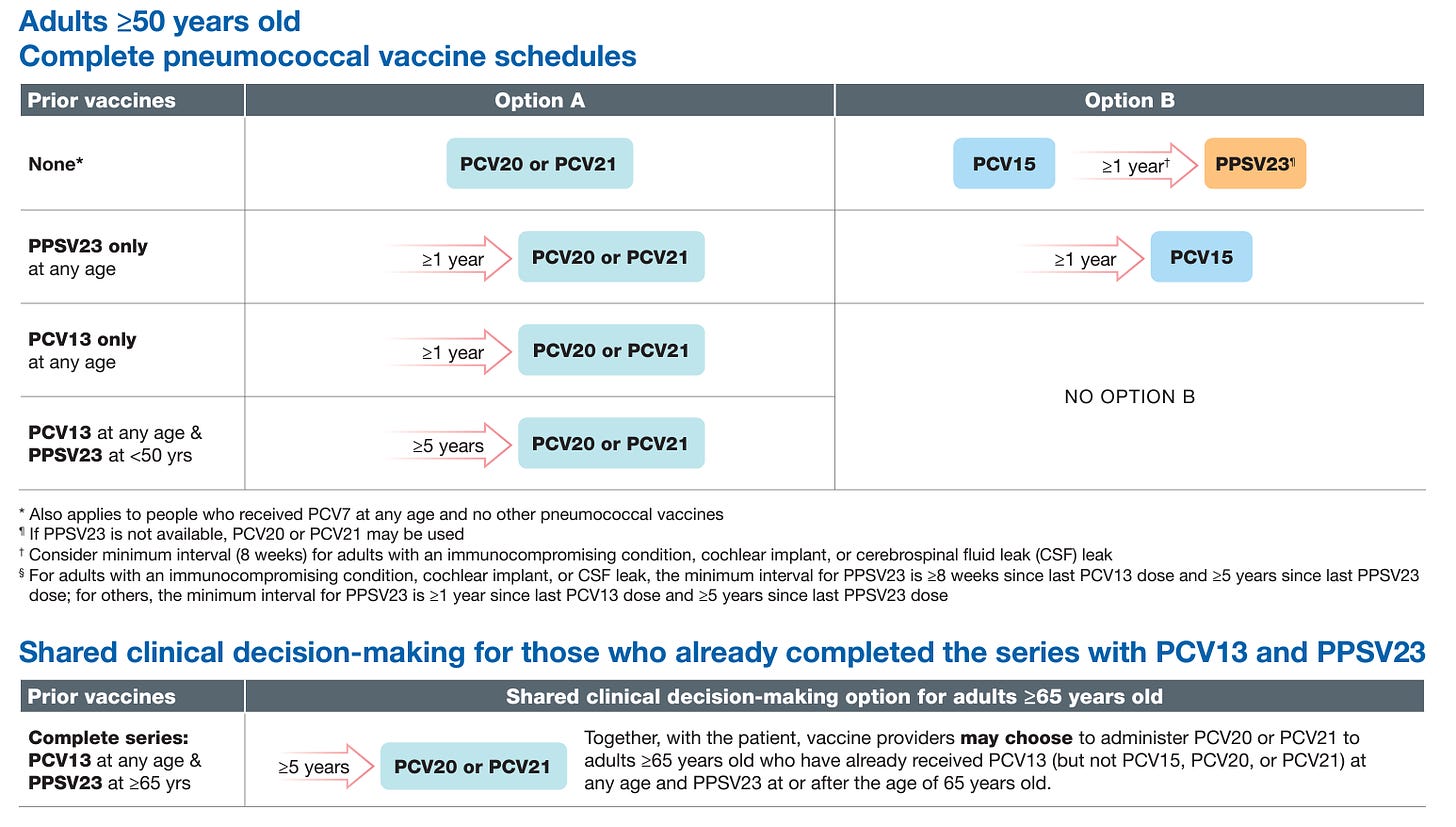The Dose (November 1)
Mental health during elections, rapid tests for viruses, confusing pneumococcal eligibility, and H5N1 in a pig.
It’s November! (How is it November?) Here is a dose of public health that may help you forget the stress of the elections. Including a Halloween poll at the end.
Your “weather” report for the week
The “big three” (RSV, Covid, and flu) are at low levels.
If you or your kid has a cough that has lingered for weeks, it may be mycoplasma pneumonia or “walking pneumonia.” Cases are typically mild, but because bacteria causes the disease, antibiotics can help. The U.S. usually gets a surge every 3-7 years, and thus far, cases have been about 10 times higher this year than last year.
Opportunity to Get At-Home Tests for Multiple Respiratory Viruses This Fall!
Once the respiratory season starts heating up again, you may be interested in knowing which virus you have if you get sick. Some brilliant City University of New York scientists are working on cutting-edge, multi-pathogen rapid tests for Covid-19, RSV, and influenza (with flu a and b subtyping). They are recruiting study participants and shipping testing kits right now!
Participation in the study involves completing surveys about your health. You will also have free at-home testing for Covid-19, RSV, and flu.
Here is a video about what you can expect from the study.
They are particularly looking for people ages 50 and older or those living with chronic health conditions, but anyone over 18 in the United States is eligible to join.
If you want to participate, email recruitprotects@sph.cuny.edu with “Interested in CUNY Project PROTECTS - YLE” in the subject line.
Note: I don’t get anything from this other than cheering on my colleagues who are doing good science.
Feeling stressed from elections? You’re not alone.
The world feels very heavy a week before the election, at least to me. I’m not alone. A recent American Psychology Association report found that 3 in 4 Americans are stressed about the 2024 election.
Elections can have a pretty dramatic impact on health right before and right after, especially among those who are predisposed to heart problems. Studies have shown a dramatic increase in heart attacks, strokes, and heart failure:
One study found cardiovascular events increased nearly 2 times in the 2 days immediately following the 2016 election.
Another study found rates were 17% higher in the 5 days after the 2020 election than in the same 5 days in the period 2 weeks before the election.
I spent some time in Boston this week, speaking at several events. (Here is the Harvard recording, if you’re interested.) While I enjoyed them immensely, I found taking (a million) photos of the changing leaves and hugging friends was exactly what my soul needed to reduce stress. All this to say: Please take care of yourself in this stressful time.
Pneumococcal vaccine eligibility is lowered to 50+, and… you may need a booster.
Last week, CDC lowered the recommended pneumococcal vaccine age to 50. This seems like a straightforward policy, but… it’s complicated in real life.
Here’s the deal.
Pneumococcal disease is caused by bacteria, which can result in pneumonia, meningitis, joint space infections, and sometimes sepsis. There are around 15-25 cases per 100,000 people every year.
Since 2013, anyone over age 65 has been recommended for pneumococcal vaccination. (And children.) It was also recommended for people aged 50-64 with certain risk factors; however, uptake is incredibly low, especially for Black Americans.
Last week, CDC simplified recommendations for all people aged 50 and older. The upside: clearer eligibility. The downside: the likelihood of serious illness is low, and the vaccines are expensive.
But there’s an even bigger complication, regardless of your age. The bacterium has many different strains— about 100. So, over time, manufacturers and scientists have tried to figure out how many strains vaccines should cover, for whom they offer most benefit, and when. This has generated a variety of options:
PCV21 (Capvaxive) covers 21 strains, which is ~85% of strains that are known to affect adults
PCV20 (Prevnar 20) covers ~55% of the strains impacting adults but also includes serotype 4, which PCV21 does not include and can be important in some parts of the U.S. (This is especially important if you are in Alaska).
PCV15 (Vaxneuvance) covers 15 strains.
PCV13 (Prevnar 13) was one of the earlier vaccines available, and the one infants receive.
Because we keep adding strains, you may not be up-to-date on your pneumococcal vaccine. Here is an updated chart that may help.
Not great news coming from a pig
Earlier this week, a pig in a small backyard farm tested positive for H5N1, known as bird flu. Viruses spread, so it’s unsurprising that a virus jumped from poultry to pigs.
Then why is a pig a big deal? Pigs are dangerous hosts for bird flu because they have avian and human receptors. This makes them “mixing vessels”—if a pig is infected with a human and bird flu strains, the virus can switch genes. When this happens, the virus could become more adaptable to human spread and become a pandemic. This is how the 2009 H1N1 pandemic started.
The risk to you today is still very low. But this virus is making public health very uncomfortable.
Poll
Bottom line
You’re all caught up for the week! Have a great weekend.
Love, YLE
Your Local Epidemiologist (YLE) is founded and operated by Dr. Katelyn Jetelina, MPH PhD—an epidemiologist, wife, and mom of two little girls. YLE reaches more than 280,000 people in over 132 countries and has a team of 11 whose main goal is to “translate” the ever-evolving public health science so that people will be well-equipped to make evidence-based decisions. This newsletter is free to everyone, thanks to the generous support of fellow YLE community members. To support the effort, subscribe or upgrade below:










Dear Dr. Jetelina,
I am an avid reader of your blog from Germany and I have a question: I am considering the possibility of receiving a COVID-19 booster twice a year to minimize my risk of symptomatic infection, even though I am „only“45 years old and generally healthy. My thinking is that there is a risk of Long Covid after every infection, while the vaccine is generally safe and provides some protection against symptomatic infection, albeit for only a few months or so.
If these assumptions are true, it would follow that receiving Covid boosters every 6 month or so could be a viable strategy to minimize Long Covid risk. Also, thanks to socialised medicine, I get my Covid boosters for free, as many times as I like. Does my thinking make sense – generally speaking for "youngish" people?
I appreciate your work very much.
Kind regards
Michael
Germany
Thanks for including the H5N1 update about the pig infection. I actually saw coverage of it on my *local* news here in San Diego.